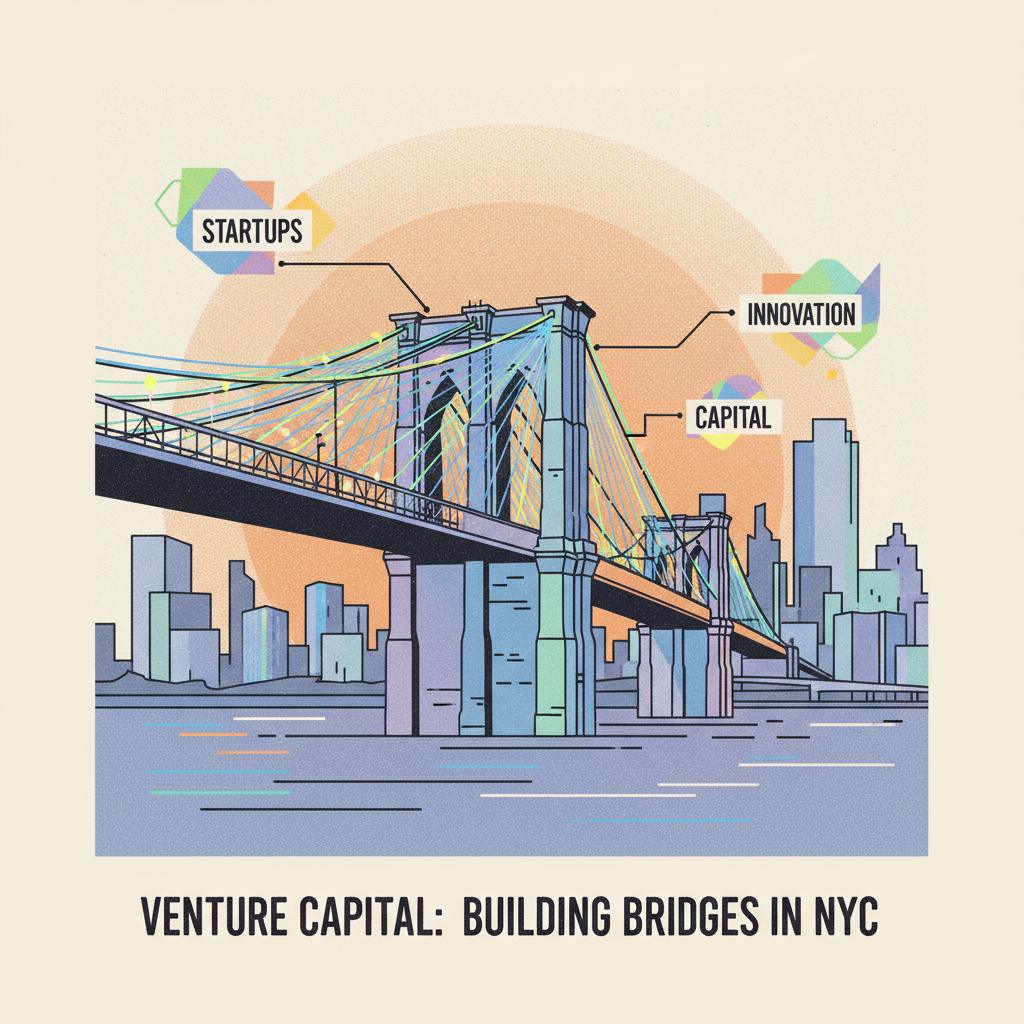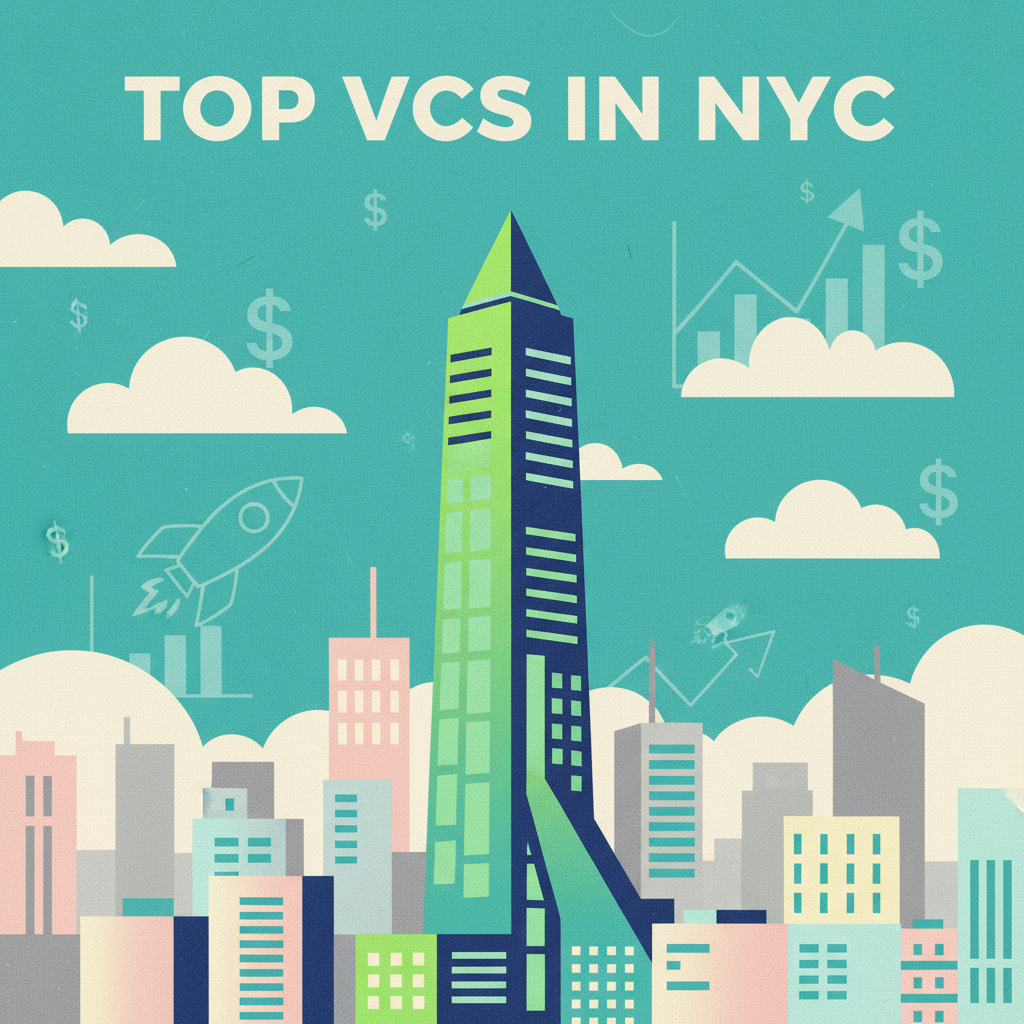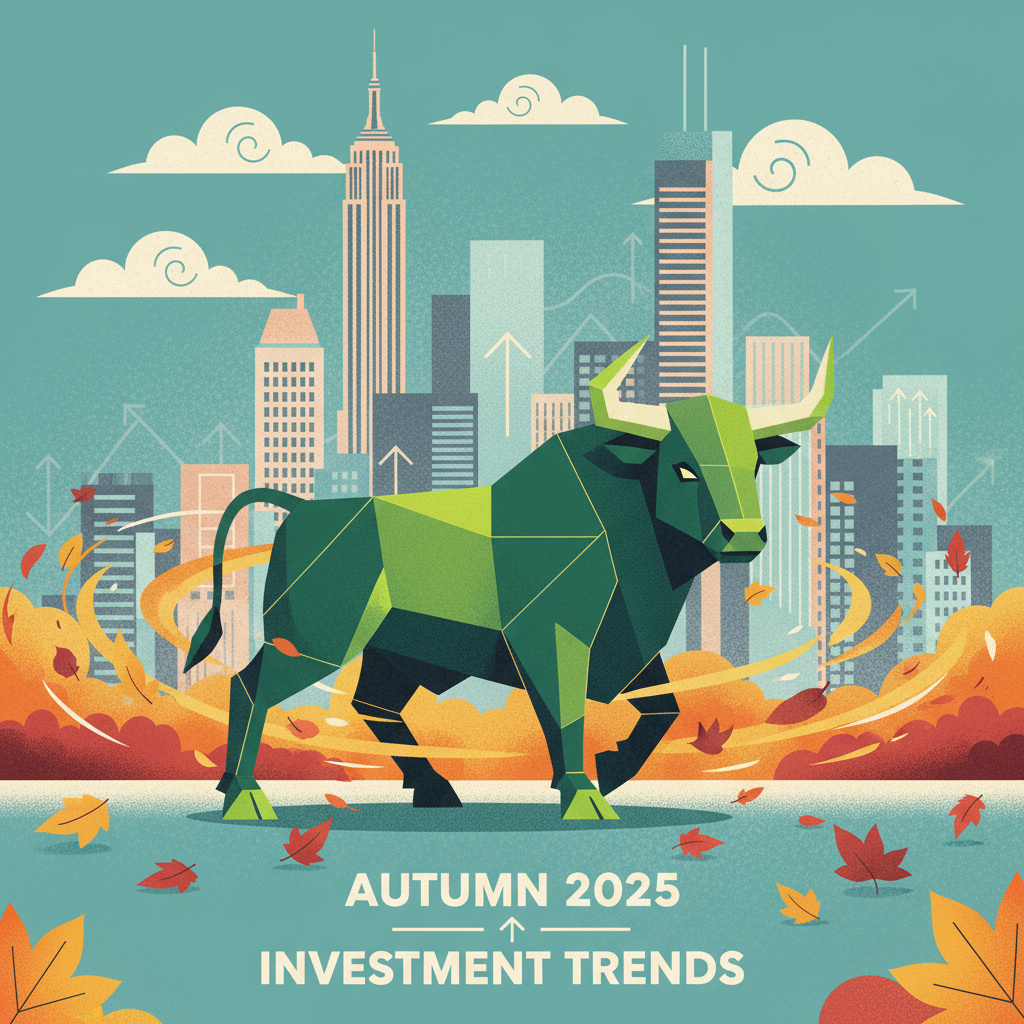· investment-strategies · 9 min read
The NYC VC Scene: Where Dreams Meet Reality (And Sometimes Get Funded)
From Union Square to SoHo, discover the wild world of New York venture capital. Meet the VCs who turned Twitter into a thing, funded your favorite apps, and occasionally lose money on really weird ideas.

Picture this: It’s 2 AM in a dimly lit SoHo loft, and I’m watching a 28-year-old founder pitch an AI-powered app that promises to revolutionize how New Yorkers order their morning coffee. The VC across the table—a former Goldman Sachs partner who’s now wearing a Patagonia vest—leans forward with genuine interest. “Tell me more about the unit economics,” he says, while the founder’s eyes light up with the possibility of a $5 million Series A.
This is the NYC VC scene in 2025: where Wall Street meets Silicon Valley, where dreams get funded (and sometimes crushed), and where $5.8 billion in venture capital flowed through the city in just Q4 2024 alone.
TLDR: The NYC VC Scene in 2025
📊 The Numbers Don’t Lie:
- $5.8B in NYC VC deals in Q4 2024 (3rd largest US hub after Bay Area’s $46B)
- 412 deals closed, with median deal size of $11M and average of $84.4M
- 43% of all US VC deal value came from just 5 “unicorn” AI deals
- 48% of top VC firms ranked portfolio support as their #1 2025 priority
🏢 The Power Players:
- Union Square Ventures (Twitter, Etsy, Coinbase)
- Andreessen Horowitz (Silicon Valley’s NYC outpost)
- Insight Partners (Growth stage specialists)
- Thrive Capital (Josh Kushner’s consumer empire)
⚠️ The Reality Check:
- Only 8 venture-backed tech IPOs in Q4 2024 (though 33% up from 2023)
- 21% of deals were down rounds (highest since 2021)
- Top VCs are 55% more selective but writing larger checks
The $5.8 Billion Question: What Makes NYC VCs Different?
Here’s what I’ve learned after years of covering this wild ecosystem: NYC VCs aren’t just investors—they’re company builders who understand that success in the city that never sleeps requires more than just a good idea and a pitch deck.
The numbers tell a fascinating story. While the Bay Area still dominates with $46 billion in VC deals, NYC’s $5.8 billion in Q4 2024 proves it’s not just playing catch-up—it’s carving out its own identity. But here’s the kicker: 43% of all US VC deal value came from just five “unicorn” AI deals, showing how concentrated the market has become.
What makes NYC VCs unique? They’re the perfect blend of Wall Street sophistication and Silicon Valley innovation. They understand unit economics because they’ve seen what happens when companies scale without them. They know the importance of brand because they’ve watched consumer companies rise and fall in the most competitive market in the world.
The Power Players: The VCs Who Built the Internet
Union Square Ventures: The Pattern Recognition Masters
Fred Wilson and his team at USV have this uncanny ability to spot the next big thing before it becomes obvious to everyone else. But here’s what most people miss: they’re not just investing in companies—they’re investing in patterns.
The Pattern They Saw:
- Twitter (2007): “What if we could share thoughts in real-time?”
- Etsy (2008): “What if we could democratize commerce?”
- Coinbase (2012): “What if money could be digital?”
The genius isn’t just in picking winners—it’s in understanding that the internet was going to change everything, and positioning themselves to ride that wave. Today, with 48% of top VC firms prioritizing portfolio support, USV’s approach of being hands-on investors looks prescient.
Insight Partners: The Growth Stage Specialists
While everyone else is chasing the next unicorn, Insight Partners has built an empire by focusing on companies that have already proven they can make money. It’s a different kind of genius.
Their Sweet Spot:
- Series B and beyond (when you’ve moved past “we have an idea”)
- Companies with proven product-market fit
- B2B software and enterprise solutions
- Growth-stage consumer companies
The numbers validate their approach: with a median deal size of $11 million and average of $84.4 million, Insight’s focus on growth-stage companies means they’re writing bigger checks for companies that have already figured out the basics. In a market where 21% of deals are down rounds, their selective approach looks smart.
The Specialists: VCs Who Know Their Lane
Thrive Capital: The Consumer Empire Builders
Josh Kushner’s Thrive Capital has quietly built one of the most impressive consumer portfolios in the city. But here’s what’s interesting: they’re not just investing in consumer companies—they’re building a consumer ecosystem.
Their Consumer Playbook:
- Warby Parker: Proving that direct-to-consumer could work for expensive products
- Allbirds: Making sustainability cool (and profitable)
- Glossier: Building community before building product
The data shows why this matters: with only 8 venture-backed tech IPOs in Q4 2024, consumer companies that can build sustainable businesses are becoming increasingly valuable. Thrive’s focus on companies that can scale profitably looks prescient in today’s market.
BoxGroup: The Early Stage Pattern Recognition Masters
If you’re still in the “we have a prototype and three users” stage, BoxGroup is your jam. But here’s what makes them special: they’re not just investing in companies—they’re investing in the infrastructure that powers the modern internet.
Their Infrastructure Playbook:
- Stripe: The payment infrastructure that powers everything
- Plaid: The financial data infrastructure that connects banks to apps
- Airtable: Making databases usable for normal people
- Ramp: Corporate credit cards that don’t suck
The genius is in the pattern: they’re not just investing in individual companies—they’re investing in the foundational tools that every other company needs. With 43% of all US VC deal value coming from AI deals, BoxGroup’s focus on infrastructure looks prescient.
The Reality Check: What the Numbers Actually Tell Us
The Good News: NYC is Still a VC Powerhouse
With $5.8 billion in Q4 2024 deals, NYC remains the third-largest VC hub in the US. The city’s unique blend of Wall Street sophistication and Silicon Valley innovation continues to attract both capital and talent.
The Challenging News: It’s Getting More Selective
Here’s where it gets interesting: VCs are becoming 55% more selective, but they’re writing larger checks. The median deal size of $11 million might seem small, but the average of $84.4 million tells a different story—the top 15 deals (over $500 million) made up 54.4% of the total value.
The Exit Reality: M&A is King
With only 8 venture-backed tech IPOs in Q4 2024 (though 33% up from 2023), M&A remains the dominant exit strategy. The 1,009 VC-backed M&A events worth $154 billion in Q4 2024 show that most successful startups are getting acquired, not going public.
The Future: What’s Next for NYC VCs
AI Everything (But Make It Profitable)
With 43% of all US VC deal value coming from just five “unicorn” AI deals, it’s clear that AI is the dominant theme. But here’s the question: which AI companies will actually build sustainable businesses?
The VCs who succeed will be the ones who can distinguish between AI hype and AI substance. It’s not enough to have an AI-powered app—you need to solve a real problem for real customers who will pay real money.
Portfolio Support Becomes Critical
Here’s a fascinating stat: 48% of top VC firms ranked portfolio support as their #1 priority for 2025. This isn’t just about being nice—it’s about survival. With 21% of deals being down rounds (the highest since 2021), VCs need to help their portfolio companies navigate choppy waters.
The Diversity Imperative
The conversation about diversity in VC isn’t just about doing the right thing—it’s about doing the smart thing. Companies with diverse teams perform better, and VCs are starting to realize that their portfolios should reflect that reality.
The Founder’s Reality: What It’s Actually Like to Raise in NYC
The Good Stuff: Why NYC VCs Are Worth It
Access to World-Class Talent: NYC has some of the best developers, designers, and operators in the world. When you’re building a company, having access to this talent pool can make all the difference.
Diverse Market Testing: You can test your product on every type of customer imaginable. From Wall Street bankers to Brooklyn artists, NYC’s diversity gives you real market feedback.
Network Effects: Everyone knows everyone, and connections matter. The best deals often happen between people who already know and trust each other.
Media Attention: If you’re doing something interesting, people will write about it. NYC’s media ecosystem can amplify your story in ways that other cities can’t.
The Challenging Stuff: The Reality of NYC’s High Stakes
High Costs: Everything is expensive, from office space to talent to that overpriced coffee. The median deal size of $11 million might not go as far as you think in NYC.
Intense Competition: With 412 deals closed in Q4 2024, everyone and their mother is trying to build the next big thing. Standing out requires more than just a good idea.
Pressure to Perform: The pace is fast, the expectations are high, and the stakes are real. With 21% of deals being down rounds, the pressure to perform is intense.
Distractions Everywhere: There’s always something cool happening, and it’s easy to lose focus. The key is staying disciplined while taking advantage of the opportunities.
The Bottom Line: What This All Means for You
Here’s what I’ve learned after years of covering this wild ecosystem: NYC VCs aren’t just investors—they’re company builders who understand that success in the city that never sleeps requires more than just a good idea and a pitch deck.
The numbers tell a compelling story. With $5.8 billion in Q4 2024 deals, NYC remains a VC powerhouse. But the reality is more nuanced: VCs are becoming 55% more selective while writing larger checks, and 21% of deals are down rounds—the highest since 2021.
The VCs who succeed are the ones who can help you navigate this complexity. They understand that building a successful company is about more than just having a good idea and some money. It’s about having the right team, the right market, the right timing, and the right support.
Your Actionable Takeaways
1. Focus on VCs Who Prioritize Portfolio Support
With 48% of top VC firms ranking portfolio support as their #1 priority for 2025, this isn’t just about getting money—it’s about getting a partner who will help you navigate the challenges ahead. Look for VCs who offer more than just capital.
2. Prepare for a More Selective Market
The data is clear: VCs are becoming more selective but writing larger checks. The median deal size of $11 million might seem small, but the average of $84.4 million tells a different story. Focus on building a compelling case for why you deserve a larger check.
3. Plan for M&A, Not Just IPOs
With only 8 venture-backed tech IPOs in Q4 2024, M&A remains the dominant exit strategy. Build your company with acquisition in mind, not just IPO dreams. The 1,009 VC-backed M&A events worth $154 billion show that most successful startups get acquired.
The NYC VC scene is evolving, but one thing remains constant: the best VCs are the ones who can help you build something that matters. Find those VCs, build something amazing, and don’t forget to invite me to your acquisition party! 🚀✨
What’s your take on the NYC VC scene? Have you raised money here, or are you thinking about it? Let me know in the comments – I love hearing about founder journeys!

